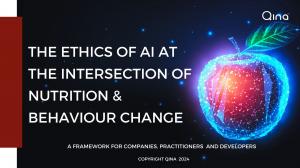
A 7- step assessment framework for companies in the ingredient, food & beverage, and digital health industry
FARO, PORTUGAL, January 23, 2024 /EINPresswire.com/ — Qina, a leading strategic consultancy and platform in the Personalized Nutrition industry, is excited to announce the release of its highly anticipated white paper on the ethics of AI (Artificial intelligence) with a focus on personalized nutrition. This first white paper aims to raise awareness, and provide guidance for companies operating in the food & beverage, digital health, and ingredients sectors, highlighting the importance of implementing responsible AI practices, and to regularly assess its wider impact on society as the shift towards prevention strengthens.
Personalized nutrition is a rapidly growing industry, with an estimated worth of $64 billion by 2040 (UBS, 2020). This sector focuses on offering dietary recommendations, advice, and products based on individual data, including personal, genetic, metabolic, and lifestyle factors. The ultimate goal is to improve lifespan and increase healthspan by providing tailored solutions from prevention to medical nutrition.
Major drivers behind the industry’s growth are the increasing consumer demand for data-driven prevention, the growing adoption of digital technologies such as wearables, and personalization. The rapid adoption of Generative AI is further expected to disrupt healthcare and access to information.
Despite its vast potential, the personalized nutrition industry faces several challenges. These include a lack of adherence to recommendations, high costs associated with developing sophisticated AI algorithms, limited scientific evidence of the benefits of personalized approaches, and a lack of practice guidelines and trust from healthcare professionals.
Recognizing the transformative power of AI, Qina emphasizes the urgent need for companies to consider the social and environmental impact of technologies such as AI when developing Personalized nutrition solutions.
This white paper is the first to bring together important topics and statistics on nutrition, behavior change, ethics, and AI, providing a comprehensive framework for companies and serving as a moral compass to ensure fair and safe AI practices. It outlines the 7 pillars companies and stakeholders need to address to build consumer and practitioner trust in the long term, as well as avoid increasing inequality.
Qina acknowledges the existence of several ethical AI frameworks by different organizations in Digital health, but believes they do not go far enough in providing practical guidance for smaller companies who are developing solutions that influence dietary intake and behaviour on a daily basis.
As the Personalized Nutrition sector stands at the crossroads of technological innovation and ethical responsibility, Qina believes that AI can profoundly impact individual health and wellness on a large scale.
While the industry has made significant progress in developing personalized solutions based on personal and biological data, there is still much work to be done. The next phase requires AI systems to be transparent, inclusive, explainable, and safe, promoting prevention and the consumption of sustainable diets.
“By collectively raising awareness of the risks and opportunities associated with AI systems in nutrition and behaviour change, we can uphold and protect our societal values and morals in an ever growing world of machines.” says Mariëtte Abrahams CEO & Founder of Qina.
“We are proud to provide leadership on this important topic which will have societal implications for years to come. While we are a digital-first company incorporating AI in many areas of our own business, we feel it is our role to raise the alarm when it comes to nutrition and health. We hope that with this white paper we can shed some light on an important area, and spark some focused internal discussions about potential and existing blindspots” says Mariëtte Abrahams
To access the Qina’s white paper “The ethics of AI at the intersection of nutrition and behaviour change”, register at the Qina website (https://qina.tech/login) for instant download or contact Qina for further information.
About Qina:
Qina is the world’s first B2B hub for data and insights in Personalized nutrition. Founded in 2019 by CEO Mariëtte Abrahams, Qina’s mission is to make Personalized nutrition accessible to all by helping companies to access reliable data, domain expertise and a supportive network. Qina is headquartered in Portugal.
Mariëtte Abrahams CEO & Founder
Qina LDA
+351 289 702 160
email us here
Visit us on social media:
LinkedIn
YouTube
![]()
